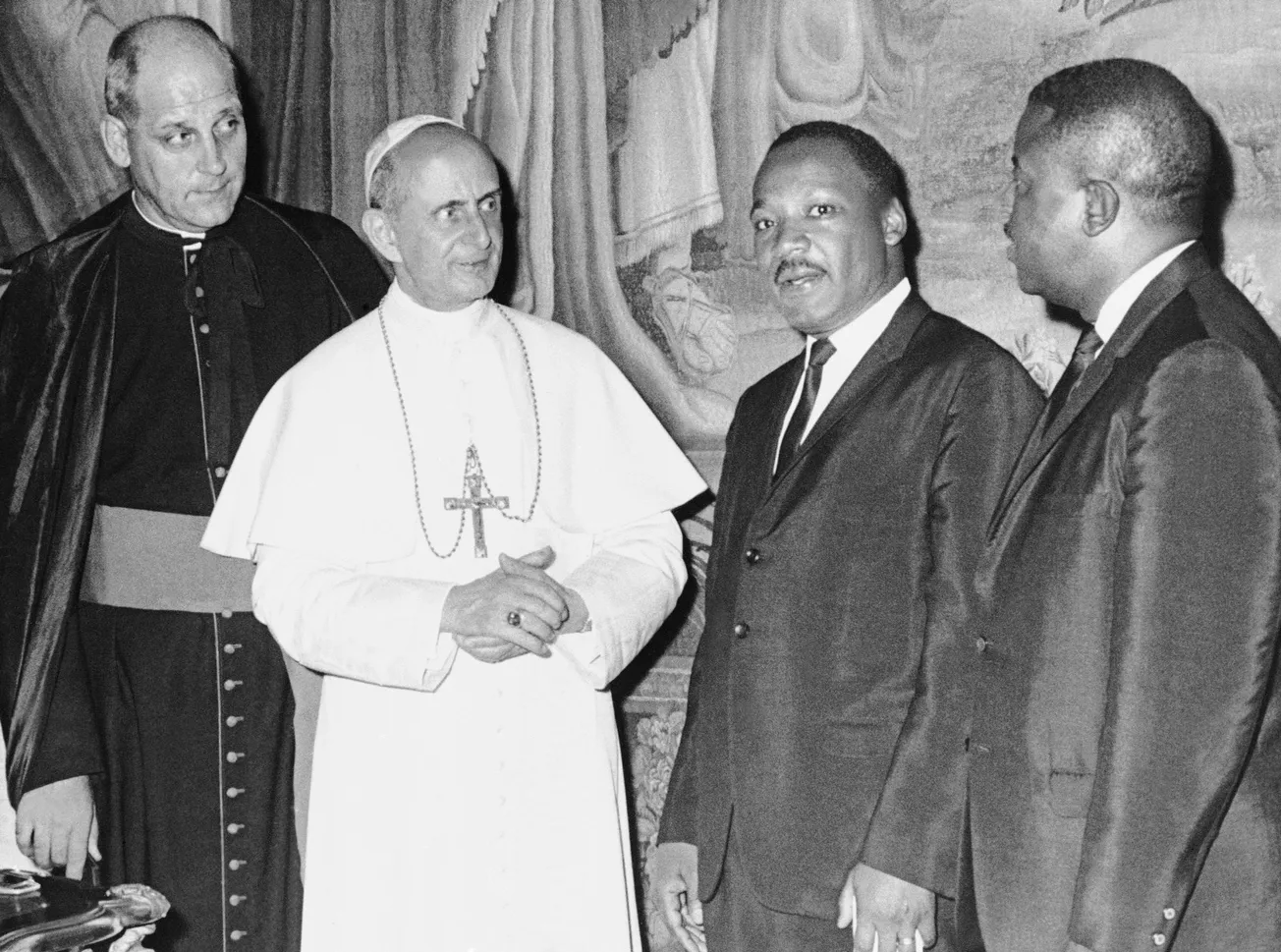One of the oft-overlooked components of Dr. Martin Luther King and the Civil Rights Movement is ironically one of the obvious features. That is, that he and struggle are firmly in the tradition of the Black Social Gospel. This tradition began in slavery, is evident in the spirituals, gave birth to Reconstruction, and has essentially been responsible for the mental health and physical survival of Black America for centuries.
This tradition is important for Black Catholics, as most of us live in two worlds. We live in the Catholic Church—with the liturgical year, daily Mass, the Eucharist, Catholic social teaching, the communion of saints, the Mother of God, the Rosary, the Triduum, religious orders, global connections, and other gifts that keep us Catholic despite the failings of the institution.
The other world Black Catholics live in is the tradition of Black Social Gospel. It enables us to often have more in common with Black Protestants than we do with White Catholics. I believe that a look at how the different racial/religious demographic groups voted in the last presidential election will illustrate my point.
One could make the observation that many White Catholics have blurred the line between nation, race and faith, with faith sometimes trailing the other two. Black Catholics, having experienced the same racial affronts as Black Protestants, see their faith as liberation from oppressive conditions. Many White Catholics are also allies in this struggle, but from my vantage point, most are not. I frankly would love to be proven wrong on this.

King was one of the most vivid examples of the Black Social Gospel tradition. His holiday is a good occasion to revisit its lessons and legacy. Dr. Gary Dorrien’s book, “Breaking White Supremacy: Martin Luther King Jr. and the Black Social Gospel” is an excellent summary. Dorrien argues that King was a proponent of the tradition, a movement that:
“stood for social justice religion and social consciousness. It combined emphasis on black dignity… with protest activism for racial justice, a comprehensive social justice agenda, an insistence that authentic Christian faith is incompatible with racial prejudice, and emphasis on the social ethical teaching of Jesus.”
Dorrien notes that King did not emerge from nowhere, being firmly within, nurtured by, and an advocate for the Black Social Gospel. Alongside King, Dorrien cites Drs. Mordecai Johnson, Benjamin Mays, Howard Thurman, Pauli Murray, and others as carriers of this tradition and faith.
The Black Social Gospel in many respects explains the courage and faith that King lived in his struggle for freedom. This tradition can be explained in a vision Johnson notes after the death of his beloved mother. In agony and confusion, he wondered where his life was going. In a night of fitful sleep, he had a vision that poor and hurting people passed by his bed, and for each he had a word of hope.
“I knew I had found the meaning of life. It was service, service to the poor and afflicted. And I felt that I could best render this service by… entering the ministry.”
Another in this tradition is Mays, one of King’s mentors both at Morehouse College and after. Mays noted he learned of God’s reality and humanity’s unity from his mother Louvenia and from the Black Church. He was also influenced by the socialist thinker Eugene V. Debs. Mays wrote:
“Debs inspired me greatly. [He] has shaped my sensitivity to the poor, the diseased, and those who have given their lives for the good of those sick and poor, the great and the small, the high the low.”
Many have written about how King carried Howard Thurman’s “Jesus and the Disinherited” in his briefcase whenever he traveled. In that classic book, Thurman proclaims that love and nonviolence are essential for the oppressed in their ongoing struggle for justice. He believed bitterness only hindered the energy required for justice work—and that love, as taught by Jesus, was an eternal wellspring of action. Thurman’s role as movement counselor, Howard University chaplain, preacher, and author brought a mystic’s insight to the liberation struggle.

Murray was a human rights activist, legal scholar, feminist, poet, author, labor organizer, socialist, cofounder of the National Organization of Women, and the first Black woman ordained an Episcopal priest. She fought against racial injustice, gender discrimination, segregation, economic injustice and other obstacles. She left the legal profession with the understanding that ethical and moral failures created the legal restrictions she opposed. Entering the ministry, she wrote:
“My entire life’s quest has been for spiritual integration, and this quest has led me ultimately to Christ…There is only one Christ, the Spirit of Love and reconciliation, the healer of deep psychic wounds, drawing us closer to that goal of perfection that links us to God our creator and to eternity.”
There are of course hundreds of Catholics in this tradition: Servant of God Thea Bowman, Dr. Lena Edwards, Daniel Rudd, Fr Bryan Massingale, Drs. Diana Hayes and M. Shawn Copeland, Bishop Fernand Cheri III, and hundreds of laypersons, religious, deacons, priests, and bishops.
This King holy day is a fitting time for Black Catholics to continue and revive our connection to the Black Social Gospel. A time to re-read “Letter from a Birmingham Jail,” “A Time to Break the Silence,” and Robert Hamilton’s “Dr. Martin Luther King Jr. and the Poor People’s Campaign of 1968.”
In truth, you could delete “Black” and “Social” and keep the word “Gospel.” Any reading of Jesus’ good news demonstrates how the other words merely illuminate what is already there. In the current liturgical year, Catholics (and other liturgical faiths) read from the Gospel according to St. Luke. The evangelist affirms that the Black Social Gospel of King and others is in fact Jesus’ Gospel: “The Spirit of the Lord is upon me, because he has anointed me to bring good news to the poor.”
Daryl Grigsby is the author of “Catholics for the Common Good: An Eternal Offering” from Paulist Press.









